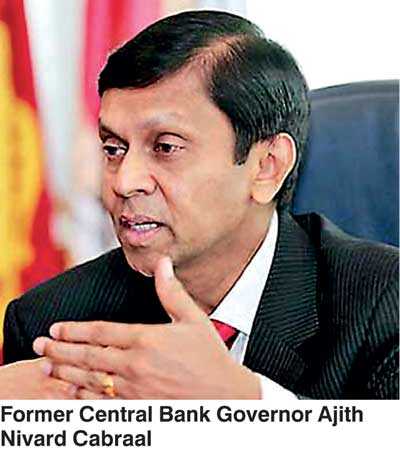Wednesday Feb 18, 2026
Wednesday Feb 18, 2026
Monday, 15 October 2018 01:15 - - {{hitsCtrl.values.hits}}
 In spite of the clarification issued by the Central Bank on 09 October 2018 (web link: https://www.cbsl.gov.lk/sites/default/files/cbslweb_documents/statistics/ otherpub/20181011_cb_response.pdf), Mr Cabraal, wittingly or unwittingly, continues his erroneous and misleading interpretation of the Central Bank’s stance on the exchange rate behaviour and management. The Central Bank wishes to emphasise that it has allowed market forces to determine the overall trend of the exchange rate, while intervening when essential to curb disorderly adjustment of the exchange rate.
In spite of the clarification issued by the Central Bank on 09 October 2018 (web link: https://www.cbsl.gov.lk/sites/default/files/cbslweb_documents/statistics/ otherpub/20181011_cb_response.pdf), Mr Cabraal, wittingly or unwittingly, continues his erroneous and misleading interpretation of the Central Bank’s stance on the exchange rate behaviour and management. The Central Bank wishes to emphasise that it has allowed market forces to determine the overall trend of the exchange rate, while intervening when essential to curb disorderly adjustment of the exchange rate.
The country’s gross official reserves currently amount to around $7.2 billion, providing a reserve coverage of around 4 months of imports. This offers sufficient space for the Central Bank to intervene aggressively in the foreign exchange market, if required. However, the Central Bank is of the view that it is neither prudent nor necessary to intervene in the market in such manner at present. Ironically, on the very day of Mr Cabraal’s statement that suggests absurd rates of depreciation of the rupee, the rupee has notably “strengthened 0.5%, as inward remittances and exporter dollar sales surpassed mild importer demand” as reported by Reuters.
In the period ahead, greater stability of the exchange rate is envisaged with the realisation of expected inflows. The first tranche of the foreign currency term loan to the Government amounting to $1 billion (with an option to upscale by a further $500 million) is to be received as early as this week. The possibility of issuing Panda and Samurai bonds is being explored, in addition to traditional US dollar-denominated Sovereign Bonds. Furthermore, a number of Middle-Eastern countries have expressed their willingness to enter into foreign currency swap facilities with Sri Lanka on favourable terms.
Meanwhile, higher seasonal inflows of workers’ remittances are expected during the last quarter of 2018, amid increased earnings in Middle-Eastern countries. Earnings from tourism, which have demonstrated double digit growth so far during the year, are expected to continue the upward trend. This trend is likely to result in a good tourist season, particularly during the months of November-March, which typically attract over 50% of annual tourist arrivals. In addition, the Government’s policy of divestiture of non-strategic assets would generate significant non-debt creating foreign exchange inflows to the country. In this regard, significant progress has been made on the divestiture of Hilton and Hyatt properties. These developments are expected to augment Sri Lanka’s gross official reserves and strengthen the external sector, along with the short- and long-term measures adopted by the Government and the Central Bank.